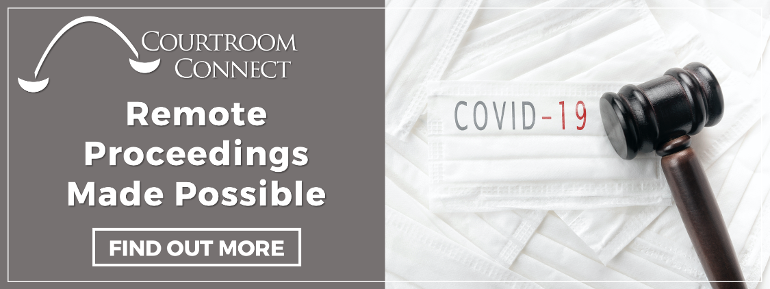
Stock image.
Editor’s note: Courtroom View Network is owned by Courtroom Connect, mentioned in this article.
The sweeping impact of COVID-19 has forced courts across the country to reimagine age-old procedures in order to protect public health and effectively manage swelling caseloads. But reworking critical proceedings like hearings and trials in an age of social distancing has proven a monumental task for already overburdened court technology teams. And it’s made more difficult by the fact that there is no single solution. Every court has different needs to consider, from the complexity of proceedings to the locations of those involved. It’s why more courts have begun to partner with remote technology specialists to better address those needs, said an executive at one of the nation’s leading remote litigation support firms.
“We’ve found a lot of jurisdictions come to us because they’re frustrated that an out-of-the-box video conference option just hasn’t worked as well for them as they’d like,” Luis Freitas, COO of Courtroom Connect, said. “Judges and court personnel are reaching out for something tailored to their needs.”
Expertise That Delivers Custom Solutions for Every Court
Courtroom Connect has drawn on its unique combination of experience in both litigation-related videoconferencing and media to deliver an unsurpassed set of solutions and help lawyers and courts across the country return to work.
Through its Remote Counsel division, Courtroom Connect has been a leading choice of legal professionals for more than a decade. Remote Counsel fully supports hundreds of remote depositions around the world each week. Meanwhile, its video-streaming expertise has long played a key role in federal proceedings, ranging from single-day hearings to the most complex multi-district litigation.
And that expertise now assists a judiciary unable to conduct business as usual. For example, while many courts have turned to Zoom teleconferences for remote proceedings, Freitas said that personnel face challenges with the application’s security issues and need more support and features than what Zoom alone provides.
But with Courtroom Connect, judges, lawyers, and court administration can work through a completely secure, Zoom-based platform fully supported by a team of Remote Counsel experts who have years of experience managing everything from the simplest remote depositions to streaming the highest-stakes trials.
Freitas said it’s an unrivaled, concierge-level service that its broad base of clients have come to rely on. “There’s no room for a do-over in these proceedings,” Freitas said. “Attorneys and judges know they can trust us to ensure that everything runs smoothly.”
Moreover, Remote Counsel’s platform is feature-rich. Its Remote Realtime tool provides universal text streaming straight to any web browser as the proceeding unfolds, while its powerful search and annotation functions allow for convenient, on-demand text queries and review.
And when ensuring public access to a proceeding is important, Courtroom Connect draws on the deep experience of Remote Counsel’s sister division, Courtroom View Network, a legal media organization that has streamed hundreds of trials across the country, live and on demand, for more than a decade. CVN’s cameras have covered the broad range of proceedings, informing and educating attorneys, law students, and other legal professionals across the country. And its reputation for professionalism and technical expertise have made CVN the media pool-feed choice of judges in high-profile cases with mass media interest.
Freitas said Courtroom Connect’s combination of experience, through both Remote Counsel and CVN, was vital in supporting the nation’s first, fully remote jury trial to reach a binding verdict. Florida’s 4th Circuit Court asked Courtroom Connect to accomplish the difficult task of protecting juror privacy while ensuring the public could watch the proceeding. Courtroom Connect’s experts obscured jurors’ identities on screen and quickly uploaded proceedings for on-demand public viewing, which supported the state’s sunshine laws and addressed a key need of the court.
“We were proud to help the 4th Circuit on such a historic proceeding,” Freitas said. “Our streaming and court technology experience really came together to address something that was critical to them and protect public access to the court.”
The Dedicated Support That Each Court Needs in Unprecedented Times
Like Florida’s 4th Circuit, courts across the country have discovered remote proceedings in the age of covid carry layers of complexities and potential complications that can overwhelm even the best courthouse technology teams. Courtroom Connect’s team of technical experts provide support tailored for any situation: from working hand-in-hand with a court’s own IT specialists in addressing targeted technical problems, to fully managing the largest remote proceedings.
“We know how stressful this adjustment has been for the court system and its staff,” Freitas said. “We’re here to deliver whatever they need.”
Plans that Work, for Courts to Return to Work
Since the pandemic first closed courthouse doors, court officers have found that there is no quick, one-size-fits-all answer to return safely to the proceedings central to their work. While solutions exist, they require an innovative, tailored approach, Freitas said, which Courtroom Connect, drawing on its unmatched experience, has been pleased to support.
“Our judiciary is an essential service. It can’t just stop indefinitely,” Freitas told CVN. “We’re proud to do whatever we can to assist courts in getting the wheels of justice running again.”
Related Information
Learn more about how Courtroom Connect can leverage its experience to solve your litigation needs.





